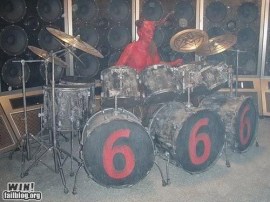I have a thing for goth chicks. Some things can’t really be explained, and this is one of them. The black clothes, the corpse makeup, the dour attitudes, the disdainful expressions… While most people when they see those things get the idea that they should probably stay away, I get a little quiver and think, “WOW, that’s hot.”
My wife is one hot goth chick. Normally, she’s a woman of science with a dizzying intellect, a tinkerer who can figure her way through nearly anything in the physical world, and a joyful worshipper of God with a firm grasp on just how good she has it. But if her life circumstances had arranged themselves a little differently, if she hadn’t been as lucky as she was in what parents she got, where she lived, what school she went to or who she hung out with, it’s in her to be a hard, hopeless and misanthropic pit-dweller. In short, she could have been very, very goth.
As it happens, her personality and spirit aren’t that way at all. But you don’t really need the personality of a goth to look like a goth – all you need is a crinoline miniskirt, some fishnet stockings and about a pound of white makeup. And you know what I think? If the look doesn’t include the attitude of goth, so much the better.
The hopeless, angry, passive-aggressive, “life is pain” attitude that most goth chicks have has a certain amount of appeal to me, but only from afar. I enjoy it more as a piece in a display case in a museum. The second that attitude applies directly to me, I start to shrink. All the goth chicks I’ve known got my male motor going, but they treated me like crap. The problem is that I don’t possess any of the things that goth chicks are looking for. And what are those things? I don’t have a clue – but they must not be any of the things I have. But I’m guessing that I’m too optimistic, too prone to see the world as a beautiful and marvelous place, and make too many assumptions about people being inherently good. Suffice to say, goth chicks don’t like me.
But my wife, thankfully, is not a goth chick – she just looks like one from time to time. We knew each other before we dated, as we went to the same church. At that time, she was involved with the youth group as a leader. When they did their annual Hunt the Spy game, she recruited me to be one of the spies (I was dressed up as a prep school geek). This game requires elaborate disguises, and Ruthanne was no exception. A few days before, she had gone to the Salvation Army store and for about $10, she had assembled a killer DIY goth chick costume, makeup and all. She was nigh-unrecognizable, 100% transformed. And when I first saw her in that goth getup, my internal response was completely predictable: “WOW, that’s hot.”
That was really the first moment in which, just for a split second, my libido took over my cognitive thought and said, “I WANT THIS!” But she had another boyfriend at the time, so I quickly shut that down. Obviously, that was the way to go, because things have worked out pretty fantastically with Ruthanne. Marriage FTW!
 A fandom for “goth rock” is an essential concomitant for goth status, but that term is nearly meaningless to the general public. Allow me to elucidate. Goth rock grew out of the punk and post-punk traditions of late ‘70s England. Joy Division had a lot to do with goth rock’s development, and they’re considered a premier proto-goth group. Punk groups had always been singing about the ills of society, but a split developed in the reaction to those ills. Punk got angry and wanted to destroy; goth didn’t. Goth wanted to just sit there and cry.
A fandom for “goth rock” is an essential concomitant for goth status, but that term is nearly meaningless to the general public. Allow me to elucidate. Goth rock grew out of the punk and post-punk traditions of late ‘70s England. Joy Division had a lot to do with goth rock’s development, and they’re considered a premier proto-goth group. Punk groups had always been singing about the ills of society, but a split developed in the reaction to those ills. Punk got angry and wanted to destroy; goth didn’t. Goth wanted to just sit there and cry.
Then there’s the visual and aesthetic aspect to goth rock, which differed wildly from punk. When punks started incorporating elements of 19th century gothic literature and ‘30s horror films (think The Cabinet of Dr. Caligari), combined with shifting musical and lyrical motifs, goth was born.
Without a doubt the best band to come out of this mutated hermaphrodite of styles that is goth rock was The Cure. Their first album, Three Imaginary Boys doesn’t differ a whole lot from the underground punk that London was teeming with in 1979, but both Three Imaginary Boys and defining single “Boys Don’t Cry” set the standard for what would become gothic rock. And like any good movement, that standard was quickly surpassed, even by The Cure themselves.
Next: so much hopelessness for just 8 tracks…
































